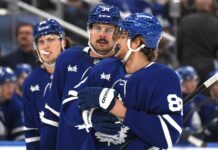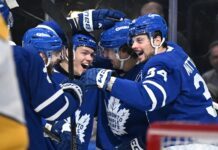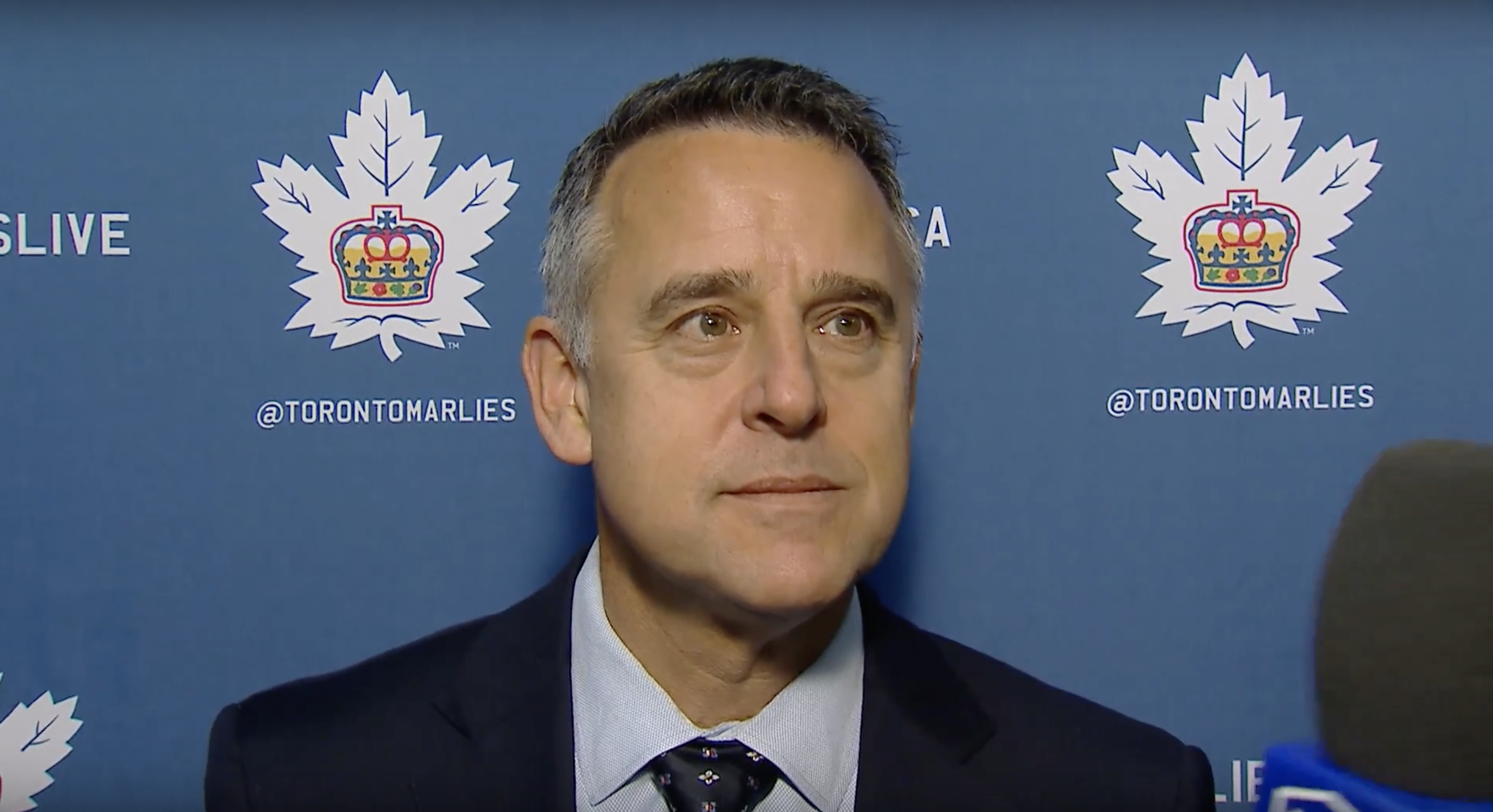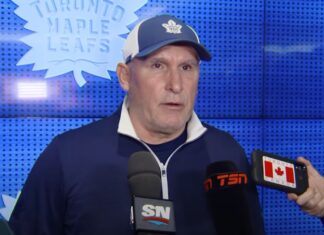New Toronto Marlies General Manager Laurence Gilman addressed the media on the home-opening night of the Marlies’ 2018-19 season.
His full remarks below.
On transitioning into the GM role and what he’s learned about the organization so far

How nice is it to jump back into managing a hockey team after some time away?
Gilman: It’s incredibly satisfying to be back and involved with an American Hockey League team, and particularly satisfying to be involved with this one, which is run like a finely-tuned machine. To have the ability to come in to the Toronto Marlies after they won the Calder Cup is a tremendous thing for someone in my position.
Not a daunting task at all, is it, to jump in after a championship?
Gilman: I was asked that question. Larry Tanenbaum asked me during the Calder Cup final: How do I really feel about the team potentially winning? My answer — because he said it was going to make it harder on me when I assume the position — was that you get so few opportunities to win anything in this business. The benefits that get garnered by the players and the coaches and the entire organization is such an amazing thing. I told him, “Hey, if we can win it, we should win it.” I am thrilled to be here now and to try to win it again.
What do you see as the most significant difference between a team that has won and one that hasn’t taken home the championship?
Gilman: I think the biggest thing you see is confidence. When you look at our players and our coaches as they go about doing their jobs every day, there is this quiet confidence that exists from having been through the wars and having climbed the mountain, as the expression goes, and knowing what it takes to win every night.
What about this organization — you mentioned it was a finely-tuned machine — stands out to you as far as how it operates?
Gilman: There is such a high degree of professionalism. Speaking about the Marlies, it starts with Sheldon Keefe and his coaching staff. It extends to Chris McKeage and the trainers, and Richard Rotenburg and Jordan Aube on the medical side, and all the way through. There is a high degree of accountability and a high degree of professionalism.
I have been around a lot of teams and a lot of organizations. It is not surprising to me that this organization won a championship last year based on the people that are comprised of this group.
How do you take what Kyle Dubas built and put your own stamp on it? What do you envision for the team?
Gilman: Truthfully, my biggest task is not to screw it up. It is a well-run ship. I have the benefit of coming in here and I don’t have to reinvent the wheel. The players know their roles, the people that do their jobs — whether it’s the coaches or the trainers or the medical people — everyone knows their roles and my job is to come in and lead.
Good leaders let people do their work. You are there to support them, but at the end of the day, people have to work and people have to grow. This is an organization that is really comprised of competent people.
What is the biggest difference at this level compared to when you were with San Antonio?
Gilman: It was a long time ago that I was with San Antonio. I don’t mean any disrespect to San Antonio or any of the organizations I was with, but this is a different entity at the American Hockey League level. It is a very big operation. It is a very complex operation. The staff is a lot bigger. The way that it operates is done on a grander scale. This is very much like a National Hockey League team with the way that it is operated.
What was the process of learning about some of the guys here like?
Gilman: It’s interesting. I got hired at the end of May, and the Marlies were en route to the Calder Cup Final. I felt it was important to observe from a distance to allow the process to unfold naturally; let Kyle, as the GM of the Marlies, enjoy the process. I didn’t integrate myself until a little bit later. The players had scattered by that point because it had been a long haul for them. It has taken me a few months to kind of get up to speed and get to know everybody, including the players and the staff. But everyone here has been extremely gracious to me. They have made my job extremely easy. I am absolutely thrilled that the season is finally underway.
How has working with Sheldon been in your early days here?
Gilman: It’s interesting — I know Sheldon and I knew Sheldon a long time ago. He played for our organization when I was with the Coyotes very briefly in Utah. I hadn’t seen him since 2005, I think it was. But our relationship has grown fairly close fairly quickly. We have a tremendous amount of mutual respect for each other. He is a Calder Cup-winning coach. It’s not like I am going in and questioning the way he does his business.
As it stands normally, I am a strong believer that players play, coaches coach, and managers manage. But Sheldon and I have gotten on incredibly well together. It’s been a great relationship to start and I expect it is only going to get better as time goes on.
What do you think about the Marlies‘ opening to the season so far after just a couple of games?
Gilman: It’s gone the way I figured it would go. It’s always hard for a team that has gone that far the prior season. You deal with fatigue — both physical and mental. It’s a very short summer. I am not surprised about the work ethic that the team has put forth. We’ve played two games. In the American Hockey League, they’re back-to-back. The second team was one that hadn’t played yet. It didn’t surprise me that our energy level wasn’t the same the second night as it was the first. This a tough league. It’s a very competitive league. All things considered, I think our team started well.
On losing Calvin Pickard, picking up Sam Gagner, and the captaincy vacancy
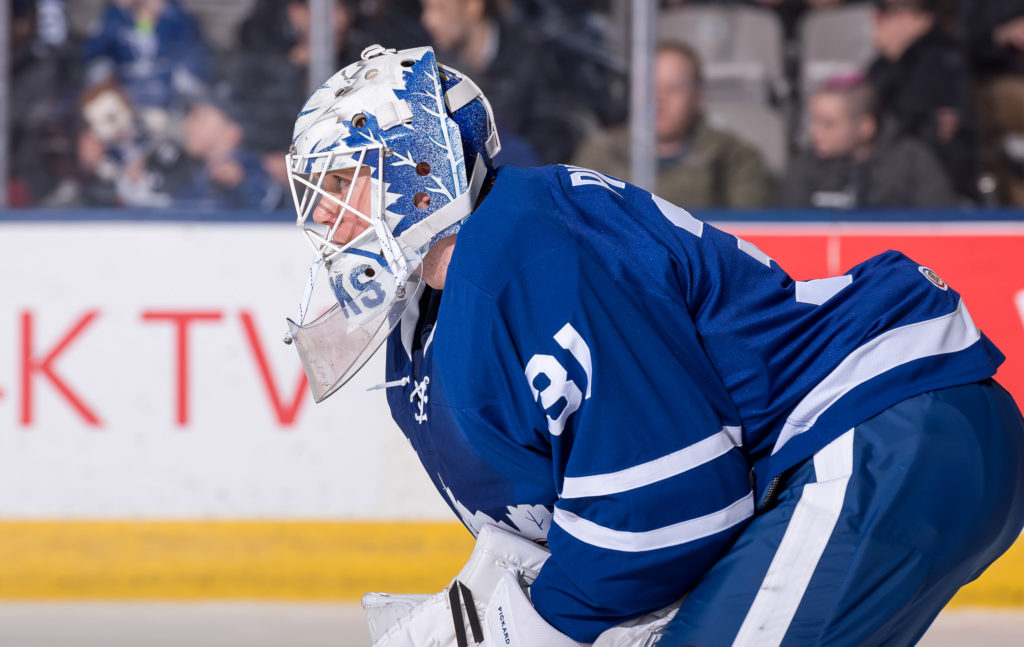
How surprised was management that both Pickard and McElhinney got claimed? That was a big strong point for this team last year.
Gilman: That is the way the system operates. We knew that there was a possibility that one or two could get claimed. Any time that you put a player on waivers, you know that is a possibility. With goaltending, it is a situational thing in many instances. Injuries occur, teams have needs, and that’s the way it goes. The system dictated itself and kept those players in the league.
Sam Gagner is an interesting addition. Why is he here instead of with his own farm club?
Gilman: I can’t speak for the decision that the Vancouver Canucks have made. That is something that Jim Benning would have to comment on. From our perspective, it was a no-brainer to grab Sam Gagner. When you have a player that has his calibre of productivity… I know Sam a little bit because I worked with his father in Vancouver. I know what kind of a tremendous human being he is.
He can play as a number-one center, a number-one distributor here. Really, bringing in a player or a veteran of this calibre is really an extension of our player development program. He is there to make the young forwards of our team — like Adam Brooks or Jeremy Bracco — better, whether that is making them better by distributing the puck to them in places where they can put it in the net, or watching him go about plying his trade day after day as a highly-skilled professional.
Is part of that to supplement some of the guys you lost — Ben Smith, Miro Aaltonen, a bunch of guys to the Leafs?
Gilman: For sure. The veterans that comprise your roster are so critically important to the culture of your organization. If you can add guys that are not just great in the room but great on the ice, it will, in turn, make everybody better and it lifts your whole organization up. That is why, as I said, when the opportunity came up to grab Sam Gagner, we didn’t think twice about it.
Is there a timeline for how long he is going to be around the team?
Gilman: We don’t have control over that. The Vancouver Canucks retain the right to control him whenever they want. We do have an understanding with them and an agreement that if they’re going to send him back to the American Hockey League, it will be to us. But, at the end of the day, he is their property and they have the right to recall him whenever they want.
Will you have a captain this year?
Gilman: That is an evolving situation. Sheldon went with three alternates to start the season. I think it will probably continue that way for a while. If someone emerges at some point that is ready to take on the captaincy, I assume that will occur. But at this point, we are taking that day to day.
On player development and the relationship with Newfoundland Growlers
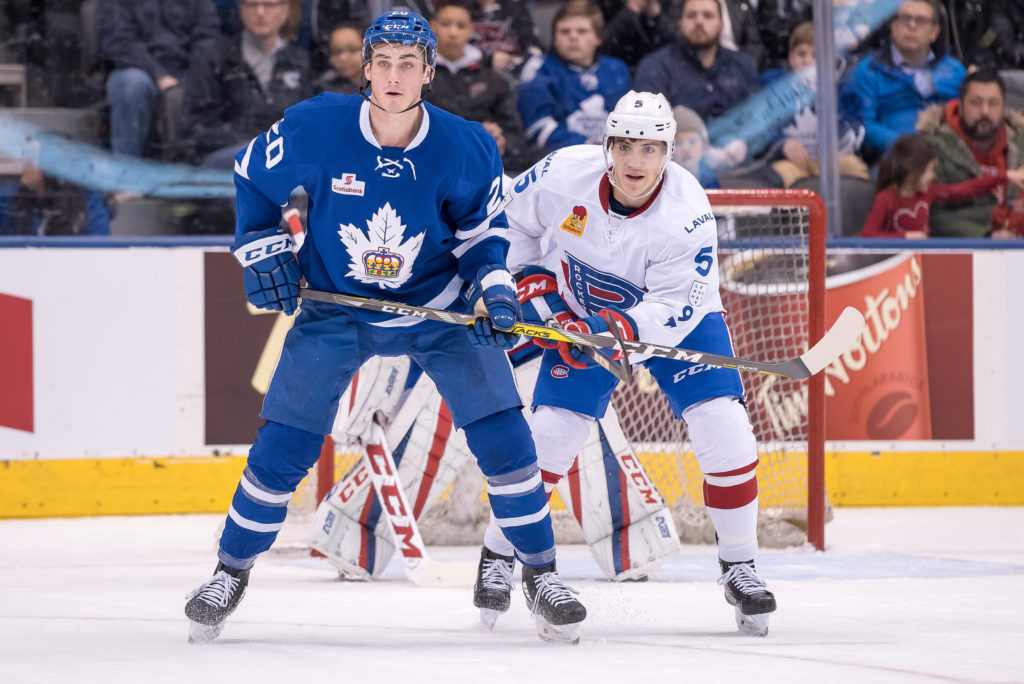
What is the best way to handle guys like Borgman and Rosen, who flew over here and probably have NHL aspirations more than AHL?
Gilman: Every player who is here has NHL aspirations, irrespective of where they came from or how old they are. The job for someone like me is really to support — well, it’s really to support everyone — but in the context of the players, it is to give them the tools that they can use to get to the NHL as fast as possible.
There may be times along the way where those players aren’t getting to where they want to get to as quickly as they would like, and it’s my job to give them a bit of older advice, or maybe push them at some point. But to my experience so far, every player in this organization has been happy to be here but clearly has an eye on playing for the Toronto Maple Leafs at some point.
With the Growlers, how do you think you might be able to take advantage of that relationship?
Gilman: The Growlers are clearly an extension of the player development department of the Toronto Maple Leafs organization. You can look at one player in particular in Mason Marchment, who this club signed to an AHL two-way contract. Our player development staff put a great deal of time into his game. He put a great deal of time into his game at the ECHL level as well as here. Now, he’s at the point where he is a bona fide prospect on an NHL entry-level contract.
We see the exact same model and the exact same paradigm working with the Growlers. We have our staff — we hired the staff for the Growlers — where you have Ryane Clowe and John Snowden on the bench. We hired the trainers as well. Our development staff will be there.
In a salary cap world, it is incredibly important to develop players so that you have a young pipeline of efficiently-salaried players that can come in. We are going to be devoting a great deal of time and energy. I will be there for their opener Friday night.
On his past experience with the league office, the expansion draft, and working as the cap manager in Vancouver
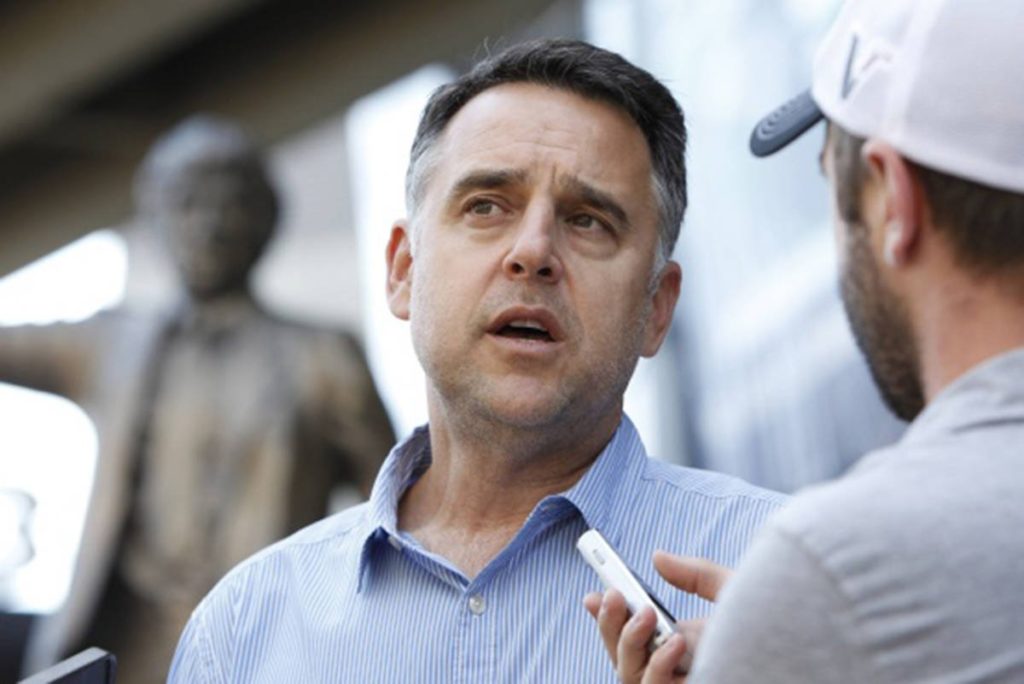
How involved are you in the Nylander negotiations right now?
Gilman: That is not something that I am in a position to comment on. I am here to comment on the Marlies and that is the extent of it.
You must play a role in it. Kyle’s mentioned in other interviews that he has leaned on your experience in these matters?
Gilman: Well, Kyle runs a very collaborative organization. He is a very good manager in that regard. He is exceptionally bright. It’s amazing… notwithstanding the fact that I am a little older from him, I learn from him every day. But any of the nuances that are going on with that negotiation is not appropriate for me to comment on at this time.
What was the most eye-opening or surprising thing you learned working right within the league office?
Gilman: I didn’t work directly in the league office. I worked on a committee to help them design the rules for the expansion draft, which was an absolutely fascinating project and one that I was incredibly fortunate to participate in. I can tell you from my experience there that the NHL cares deeply about all of its franchises — not just the expansion teams that are coming in, but the 30 teams that were in existence and how their interests were going to be protected and how everything would be balanced.
I have had a lot of experience with Gary Bettman, Bill Daly and Colin Campbell over the years and it is an incredibly, incredibly well-run business that cares about their players, cares about their owners, and cares about the game of hockey.
Are you cheering for the Seattle situation to work out?
Gilman: Right now, my blood is blue and white and I want one thing: I want to get my name on the Stanley Cup and I’d like to get my name on the Calder Cup.
Were you as surprised as the rest of us about how far the Knights went?
Gilman: I felt that the Knights were going to be a very competitive team. At the end of the process, whether it was through the rules of the expansion draft itself or the deals they were going to be able to cut, I felt that they were going to be a competitive team on a nightly basis. I think George McPhee and his staff deserve a tremendous amount of credit for how efficiently they managed the situation — the asset harvest that they yielded was unprecedented. I did not anticipate that they would be losing in the Stanley Cup Final, that’s for sure.
One lesson from the media’s perspective was that their success was largely driven by roster-fringe players who were put in a position to succeed that they might not have been. Does that elevate to the managerial level at all, that sort of takeaway?
Gilman: You’d have to ask NHL GMs that question. As an observer of how that process went, I think you saw a team that picked players with speed and hockey sense. They had a coach that was well aligned with the personnel. It was pretty entertaining hockey. I think it’s hockey that people want to emulate.
When you were with the Canucks and working with contracts and the CBA and that sort of thing, how much does that experience help you in this position?
Gilman: I have had a broad base of experience in my NHL career. It all helps. Fortunately, in this organization, Brandon Pridham is the point person on the contract negotiations and the salary cap matters. He is as sharp as anybody I have encountered. I have known him for 15 years. I think this organization is lucky to have him. My job is to lend a hand, wherever that may be — whether that is helping Brandon on that front, or more important, here on the Marlies on the player development side and the research and development department.



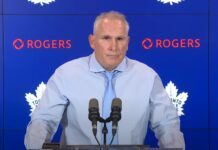



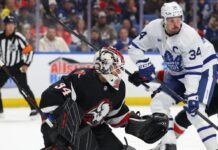

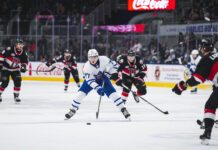


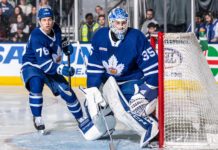

![John Gruden after the Leafs prospects’ 4-1 win over Montreal: “[Vyacheslav Peksa] looked really comfortable in the net… We wouldn’t have won without him” John Gruden, head coach of the Toronto Marlies](https://mapleleafshotstove.com/wp-content/uploads/2025/09/gruden-post-game-sep-14-218x150.jpg)



